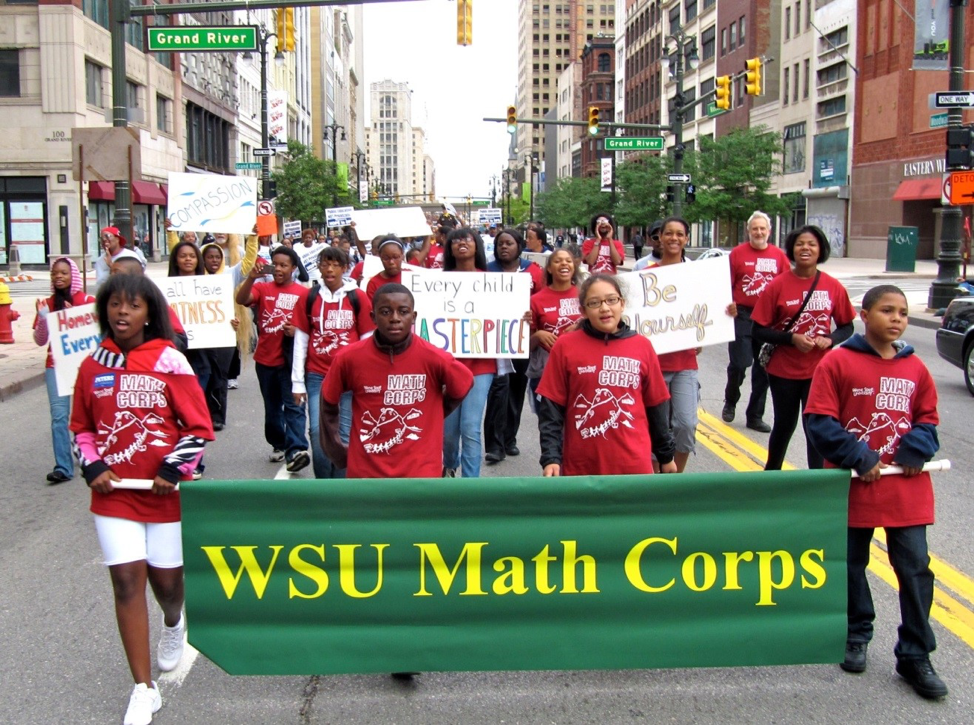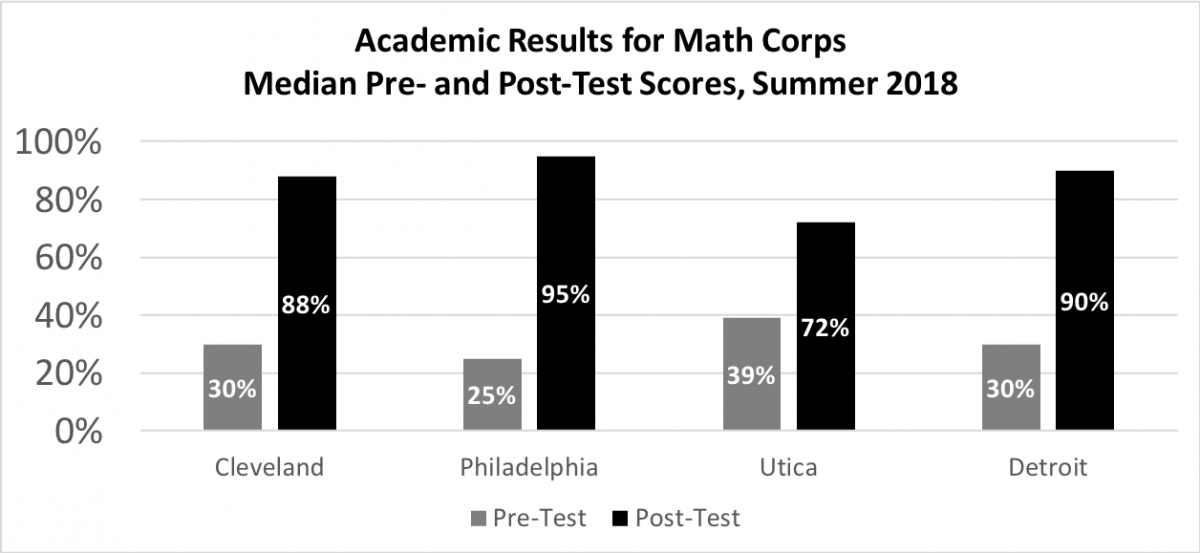The Wayne State University Math Corps: Loving and Believing in Kids
Since 1992, the Wayne State University Math Corps, a combined mathematics and mentoring program for Detroit public school students, has worked to provide Detroit’s children with the kinds of educational and lifetime opportunities that all kids deserve. In a city where the obstacles to success are so daunting, where children struggle every day to navigate the loss of a parent, neighborhood violence, or a dysfunctional school, the Math Corps is about making a difference.
The centerpiece of the Math Corps is a six-week summer camp for students entering grades 7–12. High school students serve not only as teaching assistants and role models for younger students, but essentially as “big brothers” and “big sisters”, while college students and senior staff serve as mentors to all—providing every child with a second family. Students receive math instruction in both the basics and advanced topics, while being immersed in a culture of mutual support and achievement.
With a 2016 award from the National Science Foundation’s Advancing Informal STEM Learning program, the Math Corps established three new sites in Cleveland, OH; Philadelphia, PA; and Utica, NY (award no. 1612400).
“It’s not about math.”
Ask the kids in the Math Corps, “What’s the Math Corps about?” and they’ll respond, “Well, it’s not about math.” The Math Corps redefines “STEM program”. The goal is not to teach math but to teach children, and it’s not to produce future engineers and scientists but produce futures in which children can realize their own unique dreams and passions. When you look at the city of Detroit, it’s easy to figure out what you need to bring to the table—and it’s not a computer. It’s love.
The mission of the Math Corps is simple. The philosophy is powerful: All things derive from “loving and believing in kids.” The practices flow from over 25 years of asking the same question with respect to every element of the program: “What does loving and believing in kids look like in this situation?” At the assembly on day one, every child is told that they are “unique, beautiful, and irreplaceable” and then asked to stand, each individually, as their new family provides dignified and warm applause for the simple accomplishment of being who they are. In the program’s most advanced classes, students—regardless of their math level—participate fearlessly, knowing that their colleagues will support them, particularly in failure, and that their ideas and thinking will be cherished and valued.

Embodying love in education and learning
“Love” does not mean taking 200 kids home for dinner each night. But it does mean feeling some sense of ownership and responsibility for “our kids.” It means wanting all good things for them, now and in the future, and it means sharing in their joys and their sorrows. And most importantly, it’s accompanied with the unwavering belief that there’s greatness within every child—and that empowered with opportunity, they will find it.
In the Math Corps, students are offered a vision of the world in which the message of “Be yourself” is paramount, and every child is a member of a community that’s based on kindness. As a “lifetime” program, to which students return year after year from seventh grade through college, the Math Corps seeks to inspire its kids to make the world a better and more just place.
The sequencing is critical. Begin with caring, and establish the present as a safe place to be, providing breakfast, a needed hug, or simply a reason to smile. Then, build a community, teaching values and promoting self-worth. Education, and in particular the mathematics, comes further down the list of priorities.
Impact on students
Over the course of 25 years, the Math Corps has developed and refined a revolutionary arithmetic and algebra curriculum that ensures success for virtually every student. Results have been dramatic and consistent. Summer test scores typically increase from pre-test averages of 30% to post-test averages of 90% six weeks later.
Students who have participated in the Math Corps for at least three summers have an average ACT math score over 20, significantly higher than Detroit’s average and on par with state and national results. The estimated high school graduation rate for Math Corps students is over 90%, with about 90% of those students going on to college or the military.
Replication success so far

Although it’s early days, the replication sites where the Math Corps program is being applied are thriving. Student and staff survey data, student journals, and staff interviews, along with pre- and post-test scores, are encouraging.
The results suggest that the replication sites are not only carrying out the practices of the Math Corps, but also are beginning to build the kind of culture and social systems that have existed in the WSU Math Corps for nearly three decades.
As one high school participant wrote, “The Math Corps way is being willing to put out everything you have and more for these children ...They all have their own greatness and it is our job to help them find it…If they believe in themselves, they’ll be able to make this world a better place.”
What comes next?
More work needs to be done to understand just what “love” means in informal educational settings, how it is embodied in different practices, and what its power and limitations are, both for helping students find their greatness and for inspiring them with a purpose greater than themselves. How do we distinguish between a program that simply carries out love-oriented practices, as opposed to one that truly embodies love and incorporates a deep commitment to love in all its decisions? How can we assess and help improve the role of “love” in a community of practice? The Math Corps is investigating these questions and others, while continuing to serve hundreds of students annually.
If you are interested in learning more about our model for engaging youth, please email Jeremy Singer at jsinger@mathcorps.org.